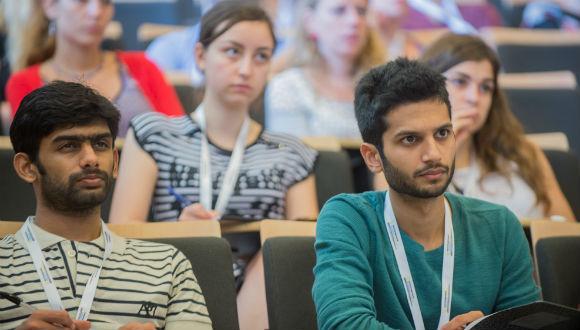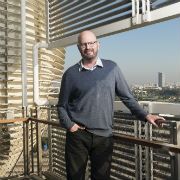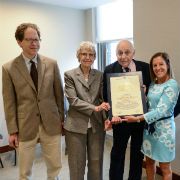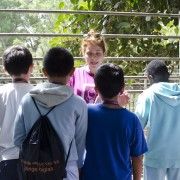Coming for Advanced Studies…and the Tel Aviv Beach
As the academic year drew to an end and the majority of Israeli students took off for the long summer break, TAU opened its doors to over 200 international students for a range of stimulating summer programs. The summer schools and workshops position TAU as a major global center for specialized learning at the undergraduate, graduate and post-graduate levels. They also help familiarize international students with Tel Aviv University and create “ambassadors” for Israel.
Nanomedicine
Some 50 graduate and post-doctoral students attended the “IEEE Summer School on Regenerative Nanomedicine: From Advanced Delivery Systems to Electronic-based Devices,” held by the Tel Aviv University Center for Nanoscience and Nanomedicine. The program, which received support from TAU’s Marian Gertner Institute for Medical Nanosystems, was oriented toward cutting-edge research and technologies in tissue engineering, drug delivery and biological interfaces with electronics.
Hailing from 14 countries – the USA, Germany, Denmark, Spain, Italy, Greece, Turkey, Czech Republic, Poland, Russia, India, China, Thailand and Israel – the students attended lectures by leading researchers from TAU and top universities abroad. Classes were supplemented with a poster session presented by students, a social get-together, and tours of the Sea of Galilee and Jerusalem.
The program was organized by Director of the Nano Center Prof. Yael Hanein, together with Prof. Dan Peer and Dr. Tal Dvir, both of the George S. Wise Faculty of Life Sciences.
Biology + neuroscience and more
The Summer Research Program in Biological and Neuro Sciences is run by TAU International in collaboration with the Sackler Faculty of Medicine, George S. Wise Faculty of Life Sciences, Sagol School of Neuroscience, School of Psychological Sciences, Raymond and Beverly Sackler Faculty of Exact Sciences and Iby and Aladar Fleischman Faculty of Engineering. Originally meant to cover biology and neuroscience, the program now includes chemistry and physics research, as a result of requests by the students.
The eight-week program accepted exceptional undergraduate students from North America, Europe and Asia. They experience science first-hand by becoming active members of a TAU research group, where they are mentored by TAU graduate students. Twenty-five are taking part in the program, which is coordinated by Prof. Karen Avraham, Vice Dean of TAU’s Sackler Faculty of Medicine, and Maureen Meyer Adiri, Director of TAU International. “This is a great opportunity to train excellent students in the cutting-edge research conducted at TAU,” says Prof Avraham. “It’s so exciting to get a group that soaks up the atmosphere and contributes as much as they can to our labs and research. These are aspiring students who want to make a difference in their career and know they can do so by being at TAU.”
Food security
Over 150 graduate and postgraduate students from Asia and Africa will gather in July for the 2016 Summer Institute run by TAU’s Manna Center Program for Food Safety and Security. The impressive enrollment includes students from Ethiopia, Myanmar, Nigeria and Russia. Topics to be covered at the Institute include plant molecular breeding; desert agriculture; food security policy and economics; bioethics; nutrition and public health; and plant epigenetics and gene expression in changing environments.
Head of the Manna Center Prof. Nir Ohad says: “This is a truly interdisciplinary program where students from diverse backgrounds – in life sciences, social sciences, law and engineering – can create a shared language of food security and bring their own experiences to the table, while gaining from our expertise.”
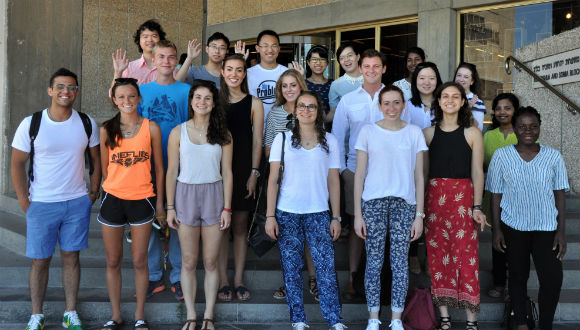
A group of summer school particpants
Photo: Lidia Loevski
Environment and politics in the Middle East
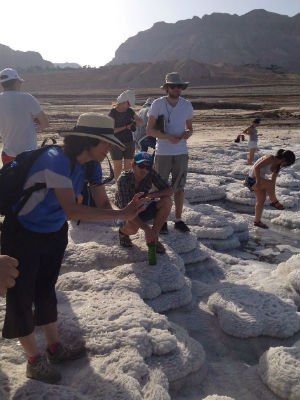
Environmental challenges facing Israel and Jordan were the focus of a TAU-Columbia University study tour held jointly by Columbia University’s Earth Institute and TAU’s Porter School for Environmental Studies. Students toured sites in both countries and explored issues related to environmental sustainability, shared natural resources and cross-border collaboration. They met at each site with guest lecturers and experts, including academic researchers, NGO and governmental representatives, local officials and environmental activists.
On a blog created especially for the tour, Natalie Unwin-Kuruneri, coordinator of the tour on behalf of the Earth Institute, Columbia University, was one of many participants to reflect on the experience. “Environmental issues transcend national borders and the solution to them lies in a collaborative approach to the management of shared natural resources,” she wrote.
Tiff van Huysen of Columbia University wrote: “there are many environmental and political challenges that Jordan faces, and seeing them was difficult. But these same challenges exist also in Israel, in ‘blue and white.’ This led me to conclude that the Middle East is the only place on earth where the neighbors are so close and so far at the same time.”
The study tour was led by Prof. Joshua Fisher of Columbia University and Natalia Gutkowski, a PhD student at the Porter School and TAU’s Edmond J. Safra Center for Ethics.
For more about the importance of globalizing Israeli university studies, read what TAU President Joseph Klafter told the Jerusalem Post this year: http://www.jpost.com/Israel-News/Bring-as-many-foreign-students-as-possible-to-Israel-to-counter-BDS-454330


